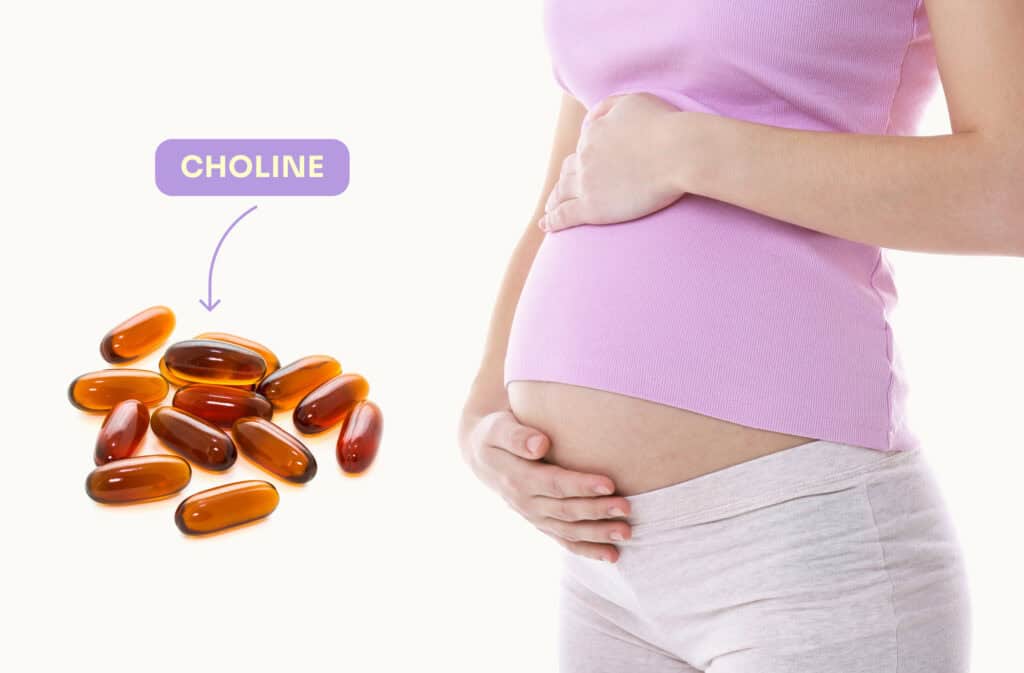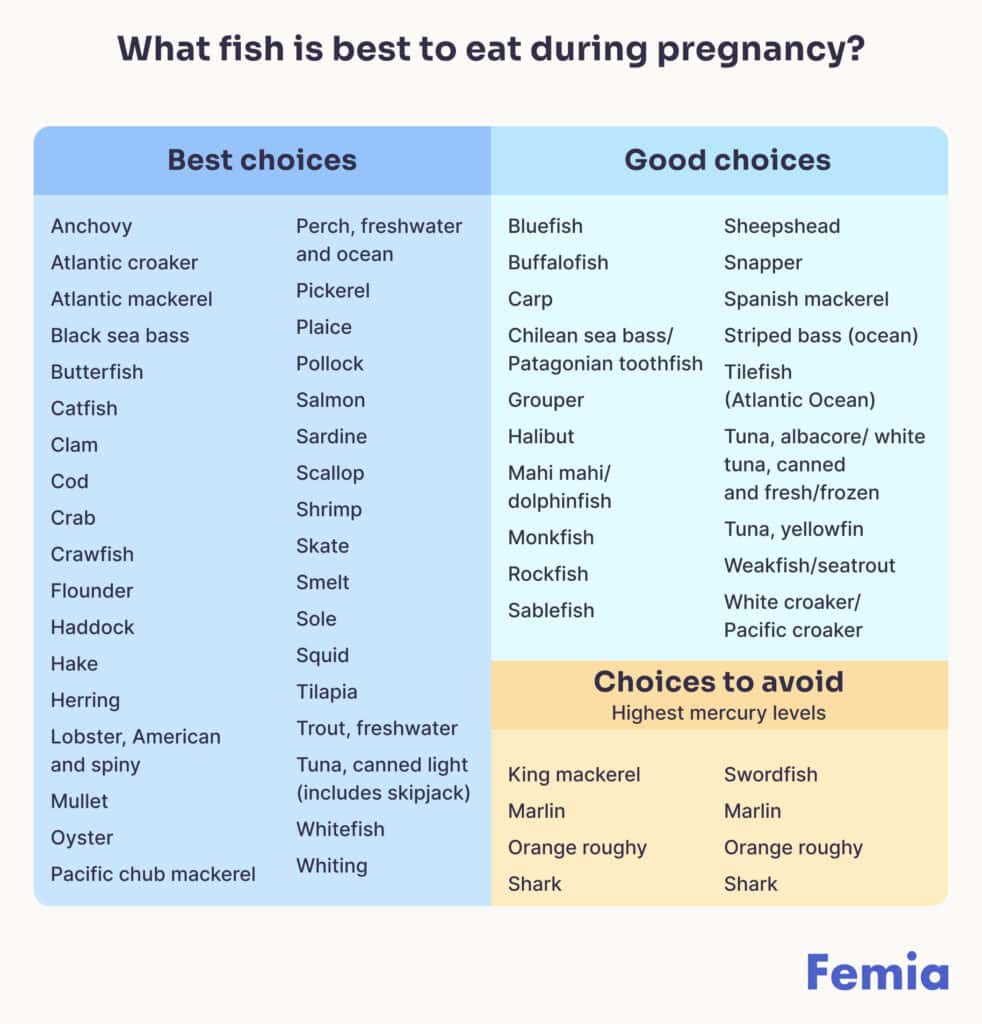Femia > Health Library > Pregnancy > Pregnancy health > Why choline is essential during pregnancy: Benefits, sources, and supplements
Why choline is essential during pregnancy: Benefits, sources, and supplements

- Updated Feb 10, 2025
- Published
CRAFTED BY HUMAN
Crafted by human At Femia, we provide accurate and up-to-date information at every stage of your journey, from trying to conceive, pregnancy and postnatal support. All content is created by a real person based on in-depth research and own professional experience. Femia ensures that you will receive expert advice, strict accuracy and a personalized approach from our authors/medical experts. Learn more about our editorial policy.
FACT CHECKED
Fact checked At Femia Health, we maintain the highest standards of editorial excellence in delivering content focused on helping you conceive, guiding you through pregnancy, and supporting you postpartum. Explore our content review principles to learn how we ensure the accuracy and quality of our health and lifestyle tips for every stage of your journey.
- Choline is crucial during pregnancy. This micronutrient aids fetal brain development, reduces the risk of neural tube defects, supports the placenta, and may also benefit maternal health.
- Most pregnant women don’t get enough choline from diet alone, as it’s often not included in prenatal vitamins.
- Aim for 450 mg daily through choline-rich foods like eggs, lean meats, and cruciferous vegetables. If concerned about intake, especially for vegetarians or vegans, consult your healthcare provider about potential supplementation.
When it comes to pregnancy nutrition, many people immediately think of folic acid, iron, and calcium. However, one essential nutrient that often flies under the radar is choline. Choline is a vital nutrient that plays a crucial role in both fetal development and maternal health, yet many women have never heard of it.
Despite its importance, many pregnant women do not get enough choline from their diets. This nutrient is often not included in prenatal vitamins, and awareness of its importance is usually low.
Understanding choline’s role and making sure you’re getting enough is crucial for both yours and your unborn baby’s health.
Track your symptoms with Femia and get tailored
health advice right on your phone
Why is choline important during pregnancy?
Choline is a micronutrient that is essential for numerous bodily functions, including brain development, liver function, and muscle movement. Our body can only make a small amount of choline by itself, this means that the vast majority of what we need to be healthy has to come from our diet.
Choline plays a vital role in helping both the mother and the baby during pregnancy. Here’s why choline is so important:
1. Supports brain development and cognitive function
What it does: Choline is crucial for the development of the baby’s brain. It helps form phosphatidylcholine, a key component of brain cell membranes, and is thought to support cognitive development and memory development in the growing fetus.
What the evidence says: Numerous studies in rodents have demonstrated that babies exposed to higher levels of choline in the womb had better performance on tasks involving memory. In 2021, a small, randomized control trial looked at children whose mothers had taken different amounts of choline during pregnancy. The children whose mothers took the higher dose of choline (930mg) during the third trimester had better sustained attention at age 7. The ability to focus for a long time is important for skills like problem-solving, and it helps with memory and school performance. Larger scale studies are needed to confirm these findings.
2. Aids in nerve function
What it does: Choline helps to make up the neurotransmitter acetylcholine, which is essential for nerve function. This means it helps nerves pass signals and thus supports muscle control, memory, and other critical functions.
What the evidence says: One 2020 systemic review looked at available human and animal studies and found that higher levels of choline during pregnancy can protect against developmental disorders and reduce the effect of excessive alcohol during pregnancy on the developing fetal brain.
3. Reduces risk of neural tube defects (NTD)
What it does: Adequate choline intake supports the healthy development of the fetal brain and spinal cord. It is thought to prevent the development of neural tube defects, such as spina bifida, which occur early in pregnancy.
What the evidence says: One large-scale study that included data from over 180,000 pregnant women found that women who consumed low levels of choline during pregnancy were at increased risk of having a baby with a NTD, especially when compared to the women who consumed high levels of choline. It is therefore important to ensure that pregnant women are getting enough choline during the early stages of pregnancy. Experts agree that further human studies are needed to clarify the optimal amount of choline that pregnant women should be consuming as well as the exact impact choline has on baby and mother.

When is choline most important in pregnancy?
Choline is vital throughout pregnancy, but there are specific periods when its intake is particularly crucial for the mother and developing baby. Here’s a breakdown of when choline is most important during pregnancy and why.
First trimester: Neural tube development
During the first trimester, choline is essential for the development of the neural tube. The neural tube later forms the brain and spinal cord. This development occurs very early, often before many women know they are pregnant. According to the American College of Obstetricians and Gynecologists (ACOG), adequate folate and choline intake during this period helps prevent common birth defects, such as spina bifida and anencephaly.
👉Find out more: First trimester pregnancy diet: 1 to 3-month pregnancy diet chart and meal plans
Second and third trimesters: Brain and cognitive development
Throughout the second and third trimesters, choline continues to be crucial for the baby’s brain development. This nutrient supports the growth and maturation of the brain and is thought to affect areas that influence memory, learning, and cognitive function. One small study found that women who consumed high levels of choline (930mg) during the third trimester went on to have children who tested better on cognitive function tests at age 7. Larger studies are required to confirm these findings and to answer the question: what is the optimal daily amount for pregnant women?
Throughout pregnancy: Overall fetal growth and development
The fetus lives in a high choline environment—the levels of choline in amniotic fluid are ten times greater than the levels of choline in the mothers blood. This tells us that choline is vital to the fetus.
Choline is necessary throughout the entire pregnancy to support the placenta and overall fetal growth and development. It helps cell membranes form, which ensures the integrity and function of cells as they rapidly divide during growth.
What does choline do for pregnancy?
Benefits for the developing baby
Cognitive development
The amount of choline consumed during pregnancy is linked to a baby’s improved cognitive function and memory after birth. Most research on choline and brain development has been done in animals; however, one “first of it’s kind” human study found that high doses of choline during pregnancy can protect the brain against some of the negative effects caused by heavy alcohol intake during pregnancy. This suggests that choline is an important nutrient for brain development in the uterus, and having too little could have a negative effect.
Remember that no amount of choline (or any other nutrient) can make alcohol safe during pregnancy. The safest choice for your baby is always to avoid alcohol completely when you’re pregnant. If you’re concerned about your alcohol intake during pregnancy, it’s best to talk openly with your healthcare provider. They can offer support and guidance without judgment.
Prevention of neural tube defects
Adequate choline intake can help prevent neural tube defects, such as spina bifida and anencephaly, and ensure that the central nervous system develops appropriately.
Benefits for the mother
Metabolism of fats and liver health
Choline is involved in the metabolism of fats, helping to transport them from the liver to other parts of the body where they are needed. This prevents the accumulation of fat in the liver, reducing the risk of nonalcoholic fatty liver disease. Choline supports liver health, which is especially important during pregnancy, when the liver is under increased demand.
Placental function and pregnancy complications
Choline is needed for the placenta, which provides oxygen and nutrients to the growing baby, to function properly. A healthy placenta ensures efficient nutrient and oxygen transfer to the fetus, supporting overall fetal health and reducing the risk of complications during pregnancy.
There’s been some interesting research about choline and pregnancy health. One small study looked at pregnant women who took 930 mg of choline daly during their third trimester. The study found that these women had lower levels of a certain enzyme in their blood. This enzyme is often higher in women who develop preeclampsia, a serious pregnancy complication.
Of course, this doesn’t mean that taking extra choline will prevent preeclampsia. It’s just a clue that choline might play a role in pregnancy health in ways we’re still figuring out.
As always, the best approach is to eat a balanced diet and follow your doctor’s advice about prenatal vitamins and supplements. They know your specific situation and can guide you on what’s best for you and your baby.
Support for cognitive function and mood
Choline contributes to the production of acetylcholine, a neurotransmitter involved in mood regulation and cognitive function. Adequate choline intake may help maintain the mother’s mental health, reducing the risk of mood swings, anxiety, and postpartum depression; however human studies are required to confirm this hypothesis.
Expert recommendations
The ACOG recommends that pregnant women consume 450 mg/day of choline.
However, in 2020, a systematic review of the evidence suggested that current daily intake guidelines need to be reviewed. It also highlighted that more needs to be done to raise awareness about the crucial role that choline plays in pregnancy.
How can I tell if I am not getting enough choline during pregnancy?
The National Institute of Health (NIH) claims that 90%–95% of pregnant women in the US consume less than the recommended daily allowance of choline and are therefore at risk of developing symptoms of choline deficiency.
But it’s not always easy to know if you’re getting enough. Here’s what you should know:
- Your body makes some choline on its own, but not enough to meet all your needs during pregnancy.
- Most prenatal vitamins don’t contain choline, so it’s important to get it from your diet.
- The American College of Obstetricians and Gynecologists (ACOG) recommends that pregnant women pay attention to their choline intake.
While a choline deficiency can potentially cause health issues, many of its symptoms are similar to other pregnancy-related changes.
That’s why it’s best not to try and diagnose a deficiency on your own. Your doctor is there to help! Next time you see them, feel free to bring up any concerns about your diet or how you’re feeling. They can take a look at the big picture – your health, what you’re eating, and any symptoms you might have – and help you figure out what’s best for you and your little one.
👉Find out more: 10 weird pregnancy symptoms you didn’t know existed
Foods with choline for pregnancy
As we have seen, making sure you are consuming enough choline during pregnancy is important for you and your growing baby’s health. You might be wondering which foods can help you reach the recommended daily intake. Let’s explore some great options that are safe and nutritious for expectant moms.
Choline-rich foods (values according to the NIH)
Beef liver is known for being very rich in choline. However, it’s also high in Vitamin A, which can be a concern during pregnancy. Too much Vitamin A might affect your baby’s development.
Some sources recommend avoiding it completely, while others suggest small amounts may be okay. This is why it’s important to discuss this with your doctor.
If you’ve had liver recently, try not to worry. Occasional consumption is unlikely to cause harm. Moving forward, your doctor can guide you on whether to include small amounts in your diet or to avoid it altogether.
| Food | Quantity | Cooking tip | Choline (mg) |
|---|---|---|---|
| Eggs | One (large) | Enjoy scrambled, boiled or poached. Add to salads or sandwiches | 147 |
| Lean meats | 3 oz (beef) | Add lean cuts to stews or casseroles or stir—fry | 117 |
| Poultry | 3 oz (chicken breast) | Add to salads, soups, pasta or sandwiches | 72 |
| Oily fish | 3 oz (cod) | Poach, bake or steam. Don’t consume more than the recommended amount of oily fish per week in pregnancy | 71 |
| Cruciferous vegetables | 1 cup of cooked broccoli | Steam, roast or stir—fry. Add to soups and casseroles | 62 |
| Dairy products | 1 cup of 1% milk | Add to smoothies, cereal or have as a snack with nuts and fruits | 43 |
| Nuts and seeds | ¼ cup of dry roasted peanuts | Eat nut butters in whole wheat bread or add to salads, oatmeal, or yogurts | 24 |

If you have any concerns about the amount of choline that you are consuming,speak to your healthcare provider. They will be able to give you a personalized approach to ensuring you have a happy and healthy pregnancy.
Choline supplements for pregnancy
While some women get enough choline through a balanced diet, others may find it more challenging, especially during pregnancy, when the demand for choline increases. A meta-analysis and systematic review found that nearly 89% of pregnant women were not consuming enough choline.
Those who have dietary restrictions or follow a vegetarian or vegan diet may find it even harder to maintain an adequate intake through diet alone.
Supplements can help ensure adequate choline intake and therefore reduce the risk of neural tube defects, support cognitive development and protect the liver during pregnancy.
Track your symptoms with Femia and get tailored
health advice right on your phone
Choosing a high quality choline supplement
When selecting a choline supplement, consider the following factors to ensure you choose a high-quality product:
- Type of choline. Some multivitamin supplements contain choline, often in the form of choline bitartrate, phosphatidylcholine, or lecithin. Some supplements containing only choline are also available. No studies have compared the bioavailability (how much of the drug is absorbed into the blood) between different supplements.
- Quality. Choose supplements from reputable brands. Look for third-party testing or certifications by companies like NSF or USP to ensure quality.
- Dosage. Check the dosage to ensure it aligns with recommended guidelines. Avoid supplements with excessive amounts of choline, as too much can have adverse effects.
The amount of choline found in most supplements typically ranges from 10 mg to 250 mg.
Recommended dosages
ACOG recommends an adequate intake (AI) of 450 mg of choline per day during pregnancy. For lactating women, the AI increases to 55 0mg per day, according to the Dietary Guidelines for Americans.
It’s essential to consider your dietary intake when determining the need for supplements. If your diet is already rich in choline, you may require a lower supplemental dose or none at all.
Health risks of excessive choline
The NIH advises that taking too much choline can result in developing a fishy body odor, vomiting, excessive sweating, low blood pressure, and liver problems.
Healthy adults, including during pregnancy, should not consume more than 3500 mg a day.
Talk to your healthcare provider
Before starting any supplement, it is crucial to consult with a healthcare provider. They can help assess your dietary intake, determine your specific needs, and recommend an appropriate supplement and dosage of choline for you.
Questions from Femia community
As a vegetarian/vegan, how can I make sure I'm getting enough choline while pregnant?
While choline is typically found in higher amounts in animal products, if you are a vegetarian or vegan you can still meet your choline needs through diet alone.
Plant-based sources like soy products or kidney beans contain a high amount of
natural choline. Quinoa, broccoli, brussels sprouts, and certain nuts and seeds are also great sources. If you have any concerns about your daily intake then consider discussing these with your healthcare provider who will be able to guide you.
Will the choline in my diet interfere with my prenatal vitamins or other meds?
No, choline is generally safe to take alongside other prenatal vitamins and medications. The NIH says that choline is not known to interact with any other medications; however, you should always consult your healthcare provider before starting any new medications or supplements.
Is it possible for me to overdo it on choline just from the foods I eat?
It is highly unlikely you will be able to consume too much choline from food alone. The recommended amount of choline a day for a pregnant woman is 450 mg, while the upper limit of safe consumption is 3500 mg. The risk of excessive intake typically comes from over-supplementation.
Remember that not all foods are safe to consume during pregnancy—and even foods that are considered safe in pregnancy can cause harm in excessive amounts—and you should always consult a healthcare provider if you have any concerns.
Could taking choline boost my brain function as well as my baby's?
While the primary benefits of choline during pregnancy are for the developing baby, adequate choline intake also supports the mother’s brain health, potentially improving cognitive function and memory. One study found that adults consuming higher amounts of choline performed better on a brain performance test.
However, more studies are required to fully examine the relationship between choline and cognitive function in pregnant women.
Does the way I cook my food impact how much choline I'm actually getting?
Cooking can slightly affect the choline content in foods just like it can for any micronutrient. However, it is usually not significant enough to drastically affect your overall intake if you are consuming a variety of choline-rich foods. Steaming, microwaving, and baking tend to preserve the nutrient content of food better than other methods and decrease the risk of food-borne illnesses.
Should I keep an eye on my choline intake after giving birth, or is it only crucial during pregnancy?
Choline remains important postpartum, especially for breastfeeding women. In fact, the recommended amount of choline that a woman should have increases from 450 mg to 550 mg if they’re lactating (producing breast milk). Breast milk contains high amounts of choline, so it is imperative that lactating women are consuming enough.
The bottom line
Choline is an important micronutrient during pregnancy, it helps your baby’s brain and central nervous system to develop properly in the womb. It can also support your overall health during pregnancy and reduce your risk of getting pregnancy complications like preeclampsia.
It can be hard to make sure that you are getting enough choline during pregnancy. Where possible, focus on adding choline—rich foods like eggs, lean meats and dairy to your diet but if you have any concerns about your choline intake then discuss these with your healthcare provider. They will be able to offer personalized advice and depending on individual factors, may recommend a supplement.
References
- Bahnfleth, Charlotte L., et al. “Prenatal Choline Supplementation Improves Child Sustained Attention: A 7‐year Follow‐up of a Randomized Controlled Feeding Trial.” the FASEB Journal, vol. 36, no. 1, Dec. 2021, https://doi.org/10.1096/fj.202101217r.
- Derbyshire, Emma, and Rima Obeid. “Choline, Neurological Development and Brain Function: A Systematic Review Focusing on the First 1000 Days.” Nutrients, vol. 12, no. 6, June 2020, p. 1731. https://doi.org/10.3390/nu12061731.
- Jacobson, Sandra W., et al. “Efficacy of Maternal Choline Supplementation During Pregnancy in Mitigating Adverse Effects of Prenatal Alcohol Exposure on Growth and Cognitive Function: A Randomized, Double‐Blind, Placebo‐Controlled Clinical Trial.” Alcoholism Clinical and Experimental Research, vol. 42, no. 7, June 2018, pp. 1327–41. https://doi.org/10.1111/acer.13769.
- Jaiswal, Arpita, et al. “Choline Supplementation in Pregnancy: Current Evidence and Implications.” Curēus, Nov. 2023, https://doi.org/10.7759/cureus.48538.
- Jiang, Xinyin, et al. “A Higher Maternal Choline Intake Among Third‐trimester Pregnant Women Lowers Placental and Circulating Concentrations of the Antiangiogenic Factor Fms‐like Tyrosine Kinase‐1 (sFLT1).” The FASEB Journal, vol. 27, no. 3, Nov. 2012, pp. 1245–53. https://doi.org/10.1096/fj.12-221648.
- “Liver Disease – NIDDK.” National Institute of Diabetes and Digestive and Kidney Diseases, www.niddk.nih.gov/health-information/liver-disease.
- Moretti, Antimo, et al. “Choline: An Essential Nutrient for Skeletal Muscle.” Nutrients, vol. 12, no. 7, July 2020, p. 2144. https://doi.org/10.3390/nu12072144.
- Nguyen, Hoan Thi, et al. “Choline in Pregnant Women: A Systematic Review and Meta-analysis.” Nutrition Reviews, Apr. 2024, https://doi.org/10.1093/nutrit/nuae026.
- “Nonalcoholic Fatty Liver Disease – Symptoms and Causes – Mayo Clinic.” Mayo Clinic, 4 Apr. 2024, www.mayoclinic.org/diseases-conditions/nonalcoholic-fatty-liver-disease/symptoms-causes/syc-20354567.
- Office of Dietary Supplements – Choline. ods.od.nih.gov/factsheets/Choline-HealthProfessional.
- Poly, Coreyann, et al. “The Relation of Dietary Choline to Cognitive Performance and White-matter Hyperintensity in the Framingham Offspring Cohort.” American Journal of Clinical Nutrition, vol. 94, no. 6, Dec. 2011, pp. 1584–91. https://doi.org/10.3945/ajcn.110.008938.
- Shaw, Gary M., et al. “Choline and Risk of Neural Tube Defects in a Folate-fortified Population.” Epidemiology, vol. 20, no. 5, Sept. 2009, pp. 714–19. https://doi.org/10.1097/ede.0b013e3181ac9fe7.
Zeisel, Steven H. “Choline: Critical Role During Fetal Development and Dietary Requirements in Adults.” Annual Review of Nutrition, vol. 26, no. 1, Aug. 2006, pp. 229–50. https://doi.org/10.1146/annurev.nutr.26.061505.111156.

Learn the difference between normal and abnormal baby head shapes, when to worry about flat head syndrome, and how to address it effectively.

After having a baby, it’s normal your sex life changes, especially if you’re breastfeeding. Explore why it does and how to improve your breastfeeding sex.

Learn how PCOS supplements such as inositol, omega-3, and folic acid can help manage your PCOS symptoms and improve fertility.

